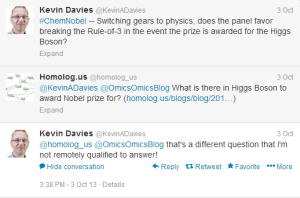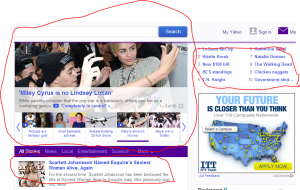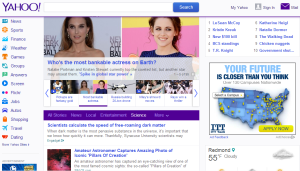
Physics Nobel Prize - Big Slap for Big Science?

Two days back, Kevin Davies asked whether Nobel committee would change its 3-person rule to award Nobel prize to 3000+ experimentalists, who spent millions of dollars of government money to discover Higgs boson. A humorous blog post at Scientific American proposed an elegant solution - give the award to the particle itself !! Nobel committee went for the more conservative solution of choosing the theorists, who predicted the existence of the particle in 1964.
Higgs and Englert were no doubt among the top contenders, but a New York times article wondered which experimentalists would be chosen - the ‘leaders’ or the ‘cogs’? Goldman Sachs model is the convention in such situations. If things go well, the ‘leaders’ get rewarded. However, if bad things happen and something is screwed up, they always find a cog (aka post-doc) to blame.
As for the experimentalists, here is where the Nobel tradition of the one genius meets the reality of collaborative modern science, and the oddsmakers throw up their hands. Unlike the Nobel Peace Prize, which has been given to groups, the physics prize so far has always gone to people. One solution would be to give the prize to the leaders of the two collaborations, CMS and Atlas, that found the boson. As of the July announcement, they were Joseph Incandela of CMS and Fabiola Gianotti of Atlas but the leadership revolves, so winning would be a fluke of timing.
Another would be to give it to the leaders of CERN: the director general, Rolf Dieter-Heuer, who muscled the two giant collaborations to the finish line; Lyn Evans, who oversaw the building of the Large Hadron Collider from its beginnings; and Steve Myers, who wrote the first paper proposing what would become the Large Hadron Collider back in 1984 and has kept the machine running. But that would leave out the unsung heroes and graduate students who did the work.
Thankfully, Nobel committee avoided all those ambiguities and went for the safer option of going for Higgs and Englert. A bigger slap on big science would have been including Philip Anderson for the award. Professor Anderson not only wrote the original paper on symmetry breaking, which motivated the work of Higgs, but also is credited for killing the wasteful big science project of the day - superconducting super collider. Needless to add, he also wrote the ‘More is Different’ article featured in our blog in the context of Higgs boson. However, adding Anderson as a third candidate would have created two problems -
i) He already got a Nobel prize for the same discovery ~40 years back. Can a person get Nobel prize for the same work twice - once when physicists recognized his work and again when big scientists hype up the same topic due to shortage of advances in physics?
ii) Goldstone had to be included too, which means we are back to 3-person problem again.
Please check this arxiv paper for a recent review.
-————————————————————
In other news, the country of big science is incredibly excited to learn, who got Nobel prize. A good place to gauge public sentiment is the right sidebar, which lists top trending words.
Yahoo USA (yesterday) -

Yahoo USA (this morning) -

Maybe it is time to follow Jonathan Eisen’s solution and put Nobel prize award as a reality show or give it based on twitter trends.
All hope is not lost on UK and Germany however.

